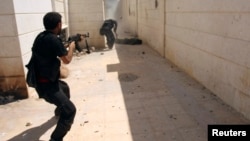Representatives from the Western-backed Syrian opposition, long distrustful of Russia’s support for President Bashar al-Assad, are due to visit Moscow this week amid a renewed diplomatic push to settle the four-year-long civil war. On Thursday the Syrian government sent a high-level delegation led by the country’s top diplomat to the Gulf emirate of Oman, which has brokered regional negotiations before.
But after four years of fighting, most Syrians say neither the government nor the main opposition represents their interests, underscoring the huge challenge of pulling off a negotiated settlement to end a conflict that has left more than a quarter-of-a-million Syrians dead.
Last month, a Syrian non-governmental organization (NGO) based in Istanbul published a disconcerting survey of 2,767 Syrians living in opposition and government-controlled areas in Syria as well as refugee camps in Jordan, Turkey and Lebanon and found a hopelessly fractured country.
A quarter of those surveyed by the Day After Association said either no party represents them or they do not know who does.
And while various opposition alternatives to the Assad government collectively receive support from almost half of Syrians, only 16.8 percent said they agreed that the Western- and Gulf-backed Syrian National Coalition represents them. In opposition-controlled areas, support for the coalition only nudges up a bit, to 19 percent. Nationwide, the Assad government has the support of 16.1 percent of respondents, although support jumps to 39.1 percent of the population in areas under government control.
Only a paltry 6.5 percent said they consider the Syrian Interim Government as representing their interests. The interim government was formed by the opposition umbrella group the National Coalition and claims to be the sole legitimate government. The armed opposition is acknowledged by 14.5 percent of those surveyed as best able to represent their interests in negotiations.
Split on negotiations
The authors of the survey, which received scant media coverage, caution that the polling used a “non-representative sample” of respondents and they say in the middle of a war zone it isn’t easy to conduct fully scientific surveying. But they argue “some significant trends can still be identified” and warn the “results portray an alarming picture” reflecting “a major crisis of political representation, whether in areas under or outside regime control.”
In the fifth year of war Syrians are also split on whether there should even be settlement negotiations - 42.5 percent of respondents rejected negotiations as a solution to the heavily sectarian conflict, with under-25-year-olds and Islamists especially skeptical. Sunni Muslims are divided about negotiating while members of Assad’s Alawi sect, an offshoot of Shia Islam, largely support the idea of talks.
The survey provides a worrying polling backdrop to the flurry of behind-the-scenes discussions involving Washington, Tehran, Moscow and Riyadh. The U.N.’s special envoy, Staffan de Mistura, is exploring the possibility of restarting peace talks and in line with a July briefing to the Security Council is “stress-testing any willingness” on the part of the government and its opponents to talk about a resolution.
Split on Assad
Opposition leaders have been adamant that Assad should play no part in any political transition. And equally, the government's foreign backers - Iran, the Tehran-sponsored Lebanese Shia movement Hezbollah and Russia - have been as adamant that Assad should remain. That is until recently, according to the White House.
On Wednesday, in the wake of the signing of an international agreement on Iran’s nuclear program, U.S. President Barack Obama told reporters at the White House that the prospects for a political resolution in Syria are improving because Russia and Iran are revising their view of President Assad’s chances of survival.
“The window has opened a crack for us to get a political resolution in Syria, partly because both Russia and Iran, I think, recognize that the trend lines are not good for Assad,” he said. “Neither of those patrons are particularly sentimental; they don’t seem concerned about the humanitarian disaster that’s been wrought by Assad and this conflict over the last several years, but they are concerned about the potential collapse of the Syrian State. And that means, I think, the prospect of more serious discussions than we’ve had in the past.”
Syria's future in question
President Assad recently conceded his army is suffering severe manpower shortages and that the government had no choice but to focus on key central and west areas and leave other territory to the rebels and jihadists.
In President Obama's midweek remarks, he acknowledged that answering the question of “how to execute an actual transition is very difficult.” He noted the strongest opposition forces on the ground are terrorist organizations. The Day After Association’s survey brings into sharp polling focus how challenging it will be to secure a transition agreement.
U.S. officials say the prospects of a collapse of the Assad government are focusing everyone’s minds, including Iran and Russia. “All the regional players are keen to shape a post-Assad Syria that fits in with their interests - or at least not to lose out too much,” said a U.S. diplomat who asked not to be identified by name.




